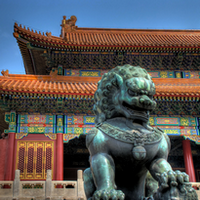We are on the verge of repeating a pair of mistakes we made two decades ago, literally across the world from the scene of our errors in 1989. One lesson of the fall of the Berlin Wall was that states, or empires, can be much weaker than they appear. The revelation of Soviet vulnerability caught many American policymakers flat-footed. Another lesson was that careful strategic thinking is necessary for the United States to exploit shifts in the balance of power. While there were some successes in navigating the emergence of a post-communist Russia and independent former Soviet republics, the United States never devised a sound strategy for building on its Cold War victory.
Today, many American foreign affairs experts appear to assume that the Chinese Communist Party (CCP) will remain in power indefinitely, and we are collectively failing to consider how a political collapse in China could create dynamics to which the United States would be compelled to respond. The challenges currently facing the CCP range from an economic slowdown to ethnic unrest and environmental decay. But underlying them all is the fragility of the party's legitimacy, which is what could lead to sudden and dramatic change.
A Legacy of Political Fragility

